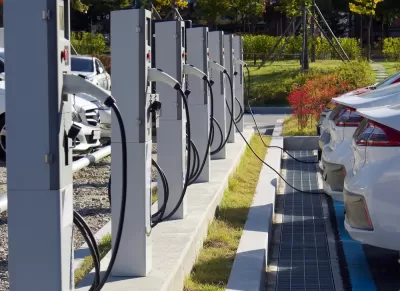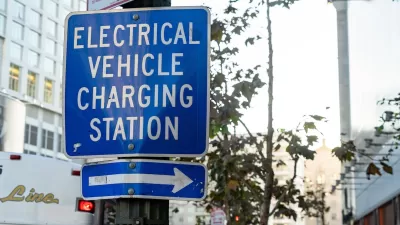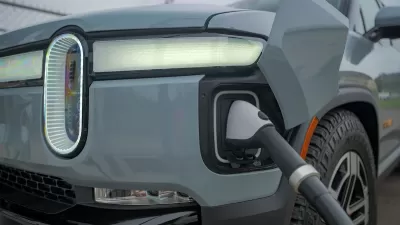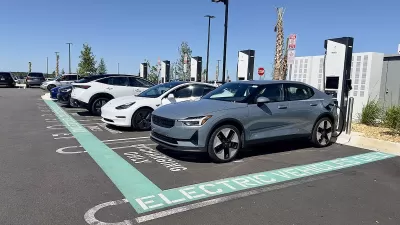A lack of regulations and zoning codes tailored to electric vehicle charging infrastructure is hindering the proliferation of charging stations.

According to a new report from the Fuels Institute Electric Vehicle Council, the widespread proliferation of electric vehicle charging stations is being stymied by outdated or nonexistent state and local policies.
As Dan Zukowski explains in Smart Cities Dive, less than half of 100 cities surveyed in 2021 had ordinances related to EV charging, and “As of 2020, 10 states had adopted installation-related policies and five had operations-related policies.”
Regulations, or the lack thereof, vary widely across the country. In some cities, new construction is required to accommodate EV charging infrastructure. Others have created online portals to streamline permitting, but many providers still wait as long as two years for a permit. “Local policies often include requirements for parking and signage; design, installation and technical issues; EV-ready building codes; and permitting specific to non-residential charging stations. EV-ready parking spaces include a junction box or 240-volt outlet.”
While some cities have made encouraging efforts, the piecemeal approach to EV charging station permitting and regulation leads to long wait times for permits and an overreliance on outdated regulations designed for fuel storage tanks and gas station infrastructure. The report recommends targeted efforts to streamline zoning and planning codes, improve coordination among different levels of government, and create EV-specific regulations and building codes.
FULL STORY: EV charging station rollout hampered by outdated state, city regulations: report

Maui's Vacation Rental Debate Turns Ugly
Verbal attacks, misinformation campaigns and fistfights plague a high-stakes debate to convert thousands of vacation rentals into long-term housing.

Planetizen Federal Action Tracker
A weekly monitor of how Trump’s orders and actions are impacting planners and planning in America.

In Urban Planning, AI Prompting Could be the New Design Thinking
Creativity has long been key to great urban design. What if we see AI as our new creative partner?

Florida Seniors Face Rising Homelessness Risk
High housing costs are pushing more seniors, many of them on a fixed income, into homelessness.

Massachusetts Budget Helps Close MBTA Budget Gap
The budget signed by Gov. Maura Healey includes $470 million in MBTA funding for the next fiscal year.

Milwaukee Launches Vision Zero Plan
Seven years after the city signed its Complete Streets Policy, the city is doubling down on its efforts to eliminate traffic deaths.
Urban Design for Planners 1: Software Tools
This six-course series explores essential urban design concepts using open source software and equips planners with the tools they need to participate fully in the urban design process.
Planning for Universal Design
Learn the tools for implementing Universal Design in planning regulations.
Gallatin County Department of Planning & Community Development
Heyer Gruel & Associates PA
JM Goldson LLC
City of Camden Redevelopment Agency
City of Astoria
Transportation Research & Education Center (TREC) at Portland State University
Jefferson Parish Government
Camden Redevelopment Agency
City of Claremont





























